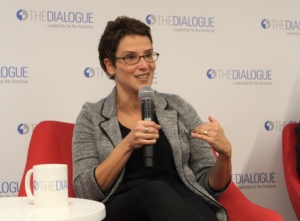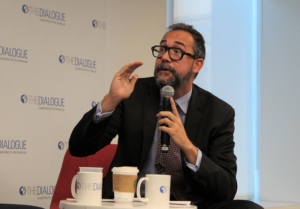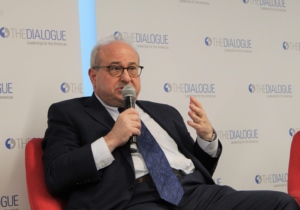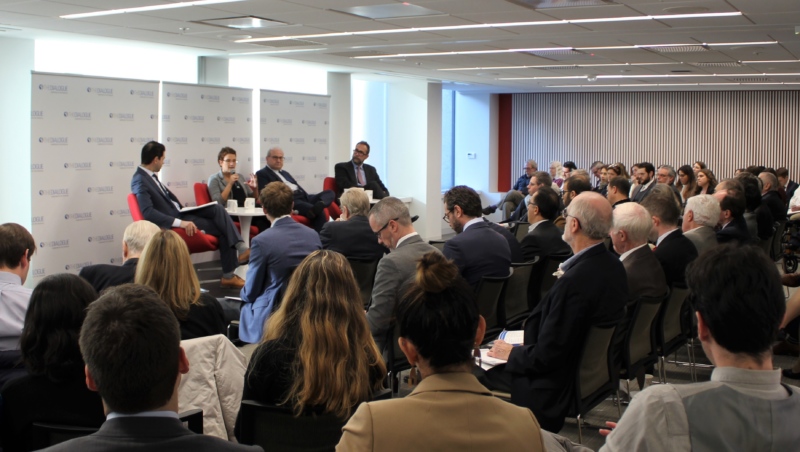The Washington Post & the OAS Secretary General
The OAS needs to be reformed, but the changes need to emerge from accurate analysis of the problems confronting both Latin America and the OAS.
On November 6, 2019, the Inter-American Dialogue hosted the event “Latin America’s Autumn of Discontent” featuring panelists Monica de Bolle, Director of the Latin American Studies Program at Johns Hopkins’ School of Advanced International Studies and Senior Fellow at the Peterson Institute for International Economics; Michael Penfold, professor at the Instituto de Estudios Superiores de Administración (IESA) and Michael Shifter, President of the Inter-American Dialogue. Michael Camilleri, director of the Peter D. Bell Rule of Law Program at the Inter-American Dialogue, moderated the event. In light of recent events in the region - mass demonstrations, contentious elections, and constitutional crises - this event sought to pinpoint some underlying drivers of the unrest, discuss the interrelatedness of the movements and determine what this wave of citizen agitation might imply for the region’s democratic future. Camilleri began the event by introducing the panelists and asking them each, “Why now?”
[caption id="attachment_89442" align="alignleft" width="300"] Monica de Bolle[/caption]
Monica de Bolle[/caption]
De Bolle answered that she believed two key components were at play in why the region is seeing a surge of unrest. First, she pointed to the 3-year supra-electoral cycle that has been happening since 2017. She noted the particularly high number of votes of repudiation, which leave newly elected leaders with little political capital. Additionally, De Bolle cited the economic component of the post-commodity boom years in which social gains across the region have stagnated, or even reversed. Shifter, while agreeing with De Bolle about the trends being seen in the region, was certain to add that the unrest seen in each country is very particular. He noted that the trends mentioned by De Bolle, while certainly true, do little to explain why the wave of unrest is happening now.
[caption id="attachment_89445" align="alignright" width="300"] Michael Penfold[/caption]
Michael Penfold[/caption]
Penfold responded by noting that this is not the first wave of unrest that the region has seen, pointing to the wave of protests seen in Venezuela, Nicaragua, Brazil, and Chile only a few years ago. However, he commented that what is most striking about this surge of manifestations is the scale and momentum of them. When considering the reasons for the scale of this wave of street protests in the region, Penfold remarked that according to statistics, the perception of fairness in the policy-making process is at an all-time low. He believes fairness and transparency are issues that are causing electorates to view the policy-making process as skewed towards the elites. These perceptions and frustrations are strong components in the surge of unrest that the region is seeing.
Throughout the event, the panelists coincided in their emphasis of the importance of perceptions and aspirations in driving unrest throughout the region. De Bolle noted the way in which Chile is a prime example of the importance of expectations. Although inequality in Chile, while high, is lower than in many other places in the region, she noted that what matters in creating frustration is how individuals feel relative to their peers or to those they aspire to be. She added that measures such as increases in fares or the removal of subsidies hit people in their pocketbook immediately and that makes them question where they are relative to others. Penfold echoed this sentiment by noting how perceptions of being in the middle class impacts individuals’ expectations, regardless of their actual income levels.
[caption id="attachment_89448" align="alignleft" width="300"] Michael Shifter[/caption]
Michael Shifter[/caption]
Michael Shifter added to this, saying that the solution is not just finding the correct formula for policy-making, rather the issue is a political disconnect or crisis of representation. He argued that society views itself as moving in one direction while the political establishment is not. This gap between the establishment and society can be seen notably in Chile, where he believes there is a large generational gap between the political elite and the electorate.
The panel concluded with a more in-depth analysis of some of the noteworthy cases of recent unrest, such as Argentina, Peru, and Bolivia, and this analysis was continued into the Q&A portion with discussion on both Cuba and Nicaragua. De Bolle ended with a discussion on the question of government size as being at the heart of much political debate in the region, particularly in the context of Brazil. Whereas big government has arguably contributed to corruption and other negative outcomes, she argued that minimal government is also not the solution. However, she noted that unfortunately, this discussion is not possible due to current polarization in the region.
Press coverage: Inequality, Corruption, Other Grievances Fuel Unrest Throughout Latin America, The Washington Diplomat (December 3, 2019)
The OAS needs to be reformed, but the changes need to emerge from accurate analysis of the problems confronting both Latin America and the OAS.
What should we expect from a newly powerful Brazil? Does the country have the capacity and leadership to be a central actor in addressing critical global and regional problems?
Although politics has cyclical features, and ideology is sometimes a factor in choices made by Latin American voters, the left-right labels obscure more than they illuminate.
 Irene Estefanía González / Inter-American Dialogue
Irene Estefanía González / Inter-American Dialogue